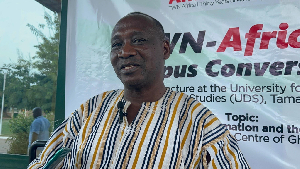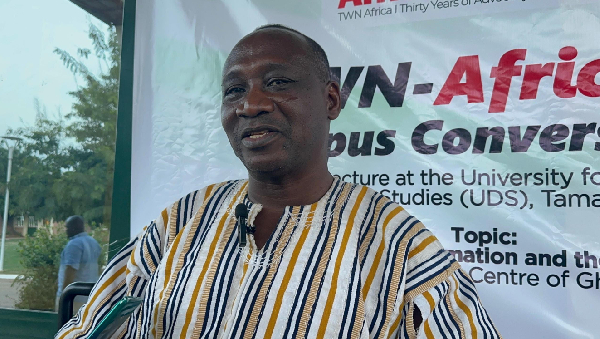 Prof Jasper Ayelazuno speaking to Ghanaweb in Tamale
Prof Jasper Ayelazuno speaking to Ghanaweb in Tamale
The Dean of the Faculty of Communication and Media Studies at the University for Development Studies (UDS), Prof Jasper Ayelazuno, has called for urgent action to address the galamsey menace in the country.
He said Ghana is no longer fighting illegal small-scale mining but well-organized, mechanized, industrialized galamsey.
Prof Jasper noted that merely describing the current state of illegal mining in the country as galamsey understates the intensity and levels of disruption of this current form of mining.
Explaining the differences between the two, the Political Scientist said that formerly, galamsey simply referred to artisanal small-scale mining where illegal miners used rudimentary tools such as pans, pick-axes, and shovels for mining.
This, he said, is different from the current form, where heavy machines such as excavators and chipping machines are used to cause massive disruptions within minutes of mining.
Speaking to GhanaWeb in Tamale on the sidelines of a public lecture on Ghana’s Extraction Industry on Thursday, Prof Ayelazuno stressed that the evolution of illegal mining from artisanal small-scale illegal mining to mechanised industrialised galamsey is the reason for the “uncontrollable disruption” the new form of galamsey is causing.
“It used to be artisanal small scale galamsey but now it is mechanized industrialised galamsey that is why we have the level of disruption that we have because with the artisanal mining galamsey, they use rudimentary tools but compare that to excavators, compare that to chanfans, compare that to all those very huge machines that are used for mining now, the disruption they can do within a minute, it used not to be so to do that kind of disruption with a pan or a pick-axe or a shovel,” he explained.
The Dean of Communication and Media Studies at the UDS added that galamsey in its earlier form, used to be a sustainable livelihood activity for rural people, just like farming.
“If you look at galamsey, it’s not what it used to be. It used to very sustainable livelihood activity of rural people, just like farming. Even when it was made illegal by the laws of Ghana, people were still mining, and they called it galamsey all the way till the 2000s,” he pointed out.
Prof Jasper blamed Ghana’s political class for facilitating their cronies, family members and sponsors to engage in this mechanized industrialized galamsey.
He opined that “After the 2000s, things changed, it’s not like galamsey just popped up from nowhere, it is something that evolved and the evolution from sustainable mining or galamsey to now uncontrollable disruption is as a result of the political class facilitating their cronies, facilitating their family members, facilitating their sponsors. You know, we’re in a democracy that is called monocracy, so they are now sponsoring them to get money from galamsey which they then use to invest in their campaign. So it is a political issue.”
Prof Jasper noted that although Ghana seem to have lost the fight against galamsey, it will have to take committed political leadership to address the menace.
The public lecture was organized by the Faculty of Communication and Media Studies (FCMS-UDS) in collaboration with Third World Network-Africa (TWN-Africa) as part of TWN-Africa’s 30th anniversary Campus Conversations public lecture series.
It was on the theme “Economic Transformation and Extractives: The Community and Women at the Centre of Ghana’s Transformation.”
Speaking at the opening of the public lecture, Pauline Vande-Pallen, Programme
Officer on Gender and Economic Policy and Extractives at TWN-Africa said the campus conversations are organized for students to understand developments in especially in the extractive industry.
She said the country’s mining industry was expanding very rapidly, and across the country, hence the need for students across the country to understand the issues to be able to shape the country and the world in the future.


